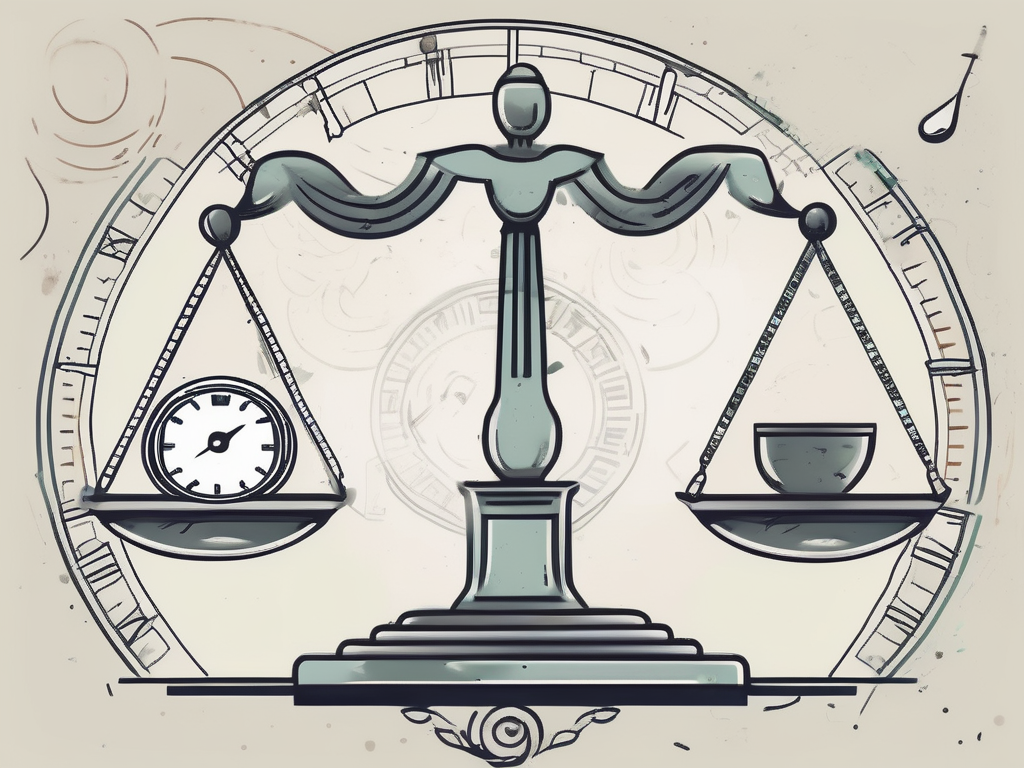Stoicism is a philosophy that dates back to ancient times and continues to be relevant in our modern society. It offers valuable insights and practical techniques that can greatly benefit individuals in various aspects of their lives. In this article, we will delve into the concept of Stoicism, explore its origins and key principles, and discuss its role in personal development, the workplace, and ethical decision-making. We will also address some common misconceptions and criticisms surrounding Stoicism. So sit back and let’s explore why Stoicism is important!
Understanding the Concept of Stoicism
At its core, Stoicism is a philosophy that focuses on attaining inner peace and living a virtuous life. It teaches us to differentiate between what is within our control and what is not, and to focus our energy on the former while accepting and adapting to the latter. Stoicism encourages us to cultivate a mindset that is resilient and resilient in the face of adversity, leading to a greater sense of peace and contentment.
Stoicism is not just a philosophical concept; it is a way of life that has its roots in ancient Greece. The philosophy was founded by a philosopher named Zeno of Citium in the early 3rd century BC. Zeno’s teachings gained popularity and spread throughout the Roman Empire, attracting influential followers like Seneca the Younger, Epictetus, and the Roman Emperor Marcus Aurelius. These philosophers expounded upon Zeno’s teachings and developed Stoicism into a comprehensive ethical and practical philosophy.
The Origins of Stoicism
Stoicism traces its origins back to ancient Greece, a time when philosophy was flourishing. Zeno of Citium, a philosopher from Cyprus, was the founder of Stoicism. He began teaching his philosophy in Athens around 300 BC. Zeno’s teachings were influenced by the ideas of Socrates and the Cynics, but he added his own unique perspective to create a philosophy that emphasized self-control, virtue, and the pursuit of inner peace.
Stoicism gained popularity in ancient Rome, where it found a receptive audience among the ruling class and the educated elite. The Roman Stoics, such as Seneca, Epictetus, and Marcus Aurelius, further developed and refined the philosophy, making it accessible to a wider audience. They wrote extensively about Stoicism, producing works that are still studied and admired today.
Key Principles of Stoicism
At the heart of Stoicism are several key principles that serve as guiding principles for living a virtuous and meaningful life:
- Focus on what you can control: Stoicism teaches us to focus our attention and efforts on things within our control. This includes our thoughts, actions, and attitudes. By accepting that we cannot control external circumstances, we free ourselves from unnecessary stress and anxiety.
- Practice gratitude: Stoicism emphasizes the importance of gratitude and appreciation for what we already have. By acknowledging and cherishing the present moment, we cultivate a positive mindset and find joy in the simplest of things.
- Acknowledge the impermanence of life: Stoicism reminds us that everything in life is transient, including our own existence. By embracing the inevitability of change and impermanence, we learn to detach ourselves from attachments and find solace in the beauty of the present moment.
- Cultivate emotional resilience: Stoicism teaches us to handle our emotions with equanimity and detach ourselves from external circumstances. By practicing self-control and discipline, we become less reactive and more capable of maintaining emotional stability in the face of challenges.
- Live in accordance with nature: Stoicism encourages us to live in harmony with nature and the natural order of the universe. This means aligning our actions and values with reason and virtue, and accepting our place in the grand scheme of things.
These principles provide a framework for living a virtuous and meaningful life. By embracing Stoicism, we can cultivate inner peace, resilience, and a greater sense of purpose.
The Role of Stoicism in Modern Society
Stoicism may be an ancient philosophy, but its relevance in modern society cannot be overlooked. In fact, its principles can be applied to various aspects of our lives, including personal development, relationships, and the workplace. Let’s explore how Stoicism can positively impact these areas:
Stoicism and Personal Development
Stoicism provides a practical framework for personal growth and self-improvement. By cultivating self-awareness, practicing mindfulness, and setting clear goals, we can align our actions with our values and lead a more fulfilling life. Stoic practices such as journaling and reflection can also enhance our understanding of ourselves and allow us to make more conscious choices.
When we embrace the Stoic principles of focusing on what is within our control, we free ourselves from the burden of worrying about external factors. This mindset shift empowers us to take charge of our own lives and make the most of every situation. Stoicism teaches us to accept the things we cannot change and focus our energy on the things we can control, leading to a greater sense of peace and contentment.
Furthermore, Stoicism emphasizes the importance of virtue and character development. By practicing virtues such as wisdom, courage, and justice, we can become better individuals and contribute positively to society. Stoic teachings remind us to act with integrity, to be honest with ourselves and others, and to strive for excellence in all that we do.
Stoicism in Relationships
Stoicism also has a profound impact on our relationships with others. By practicing empathy, understanding, and forgiveness, we can foster healthier and more meaningful connections. Stoicism teaches us to focus on the present moment and to appreciate the people in our lives, rather than dwelling on past grievances or worrying about the future.
When conflicts arise, Stoicism encourages us to approach them with a calm and rational mindset. Instead of reacting impulsively or holding onto grudges, we can choose to respond with compassion and seek resolution. By practicing Stoic principles in our relationships, we can cultivate trust, build stronger bonds, and create a more harmonious environment.
Stoicism in the Workplace
The principles of Stoicism can greatly benefit us in the professional realm as well. By embracing the idea of focusing on what is within our control, we become more resilient in the face of challenges and setbacks. Stoicism encourages us to be proactive, take responsibility for our actions, and cultivate a strong work ethic.
Stoic teachings remind us that success is not solely determined by external outcomes, but rather by our own efforts and character. By focusing on our own actions and continuously striving for improvement, we can find fulfillment in the process itself, rather than relying solely on external validation.
Furthermore, Stoicism reminds us to treat others with kindness, empathy, and respect in the workplace. By practicing virtues such as fairness and integrity, we can create a positive and inclusive work environment. Stoic principles also encourage effective communication, active listening, and collaboration, fostering teamwork and productivity.
In conclusion, Stoicism offers valuable insights and practical guidance for personal development, relationships, and the workplace. By incorporating Stoic principles into our lives, we can cultivate a greater sense of purpose, resilience, and fulfillment. Whether it’s in our personal lives or professional endeavors, Stoicism can serve as a guiding philosophy to navigate the complexities of modern society.
The Psychological Benefits of Stoicism
Beyond personal development and the workplace, Stoicism offers numerous psychological benefits that can enhance our overall well-being. Let’s explore two of these benefits:
Emotional Resilience and Stoicism
One of the key teachings of Stoicism is the cultivation of emotional resilience. By practicing detachment from external circumstances and focusing on what is within our control, we become less susceptible to emotional turmoil and more capable of maintaining inner calm.
Stoicism teaches us that our thoughts and interpretations of events greatly influence our emotional state. For example, if we encounter a setback at work, a Stoic mindset would encourage us to view it as an opportunity for growth and learning rather than a personal failure. This shift in perspective allows us to approach challenges with a sense of resilience and optimism.
Furthermore, Stoicism emphasizes the importance of accepting the impermanence of external circumstances. By recognizing that everything is subject to change, we can avoid becoming overly attached to specific outcomes. This detachment from outcomes frees us from the anxiety and disappointment that often accompany unmet expectations.
By adopting a rational and balanced perspective, we can navigate life’s ups and downs with greater resilience. Stoicism teaches us to focus on what is within our control, such as our thoughts, actions, and attitudes, rather than wasting energy on things beyond our influence.
Stoicism and Stress Management
In our fast-paced, constantly changing world, stress has become a prevalent issue. Stoicism provides effective tools for managing stress and anxiety.
By developing a mindset that accepts and adapts to external circumstances, we can reduce our attachment to outcomes and alleviate unnecessary stress. For example, if we are stuck in traffic and running late for an important meeting, a Stoic approach would encourage us to accept the situation and focus on finding alternative solutions rather than becoming overwhelmed by frustration and anxiety.
Stoic practices such as mindfulness meditation, deep breathing, and reframing negative thoughts can also help us maintain a state of calm and serenity even in the midst of chaos. These practices allow us to cultivate a sense of inner peace and detachment from external stressors.
Furthermore, Stoicism teaches us the importance of distinguishing between what is within our control and what is not. By focusing our energy on what we can influence, such as our thoughts and actions, we can avoid wasting time and effort on things beyond our power. This shift in mindset can significantly reduce stress and increase our overall well-being.
In conclusion, Stoicism offers valuable psychological benefits that can enhance our emotional resilience and stress management skills. By adopting Stoic principles and practices, we can cultivate a sense of inner calm, navigate life’s challenges with resilience, and reduce unnecessary stress.
Stoicism and Ethics
Stoicism places a strong emphasis on leading a virtuous and ethical life. Stoic philosophers believed that the ultimate good is to act in accordance with reason and virtue, and that true happiness stems from living in harmony with nature and our fellow human beings. Stoicism encourages us to cultivate virtues such as wisdom, courage, justice, and self-discipline in our thoughts and actions. By aligning our behavior with these principles, we can contribute to a more just and compassionate society.
Stoic Views on Morality
Stoicism provides a robust moral framework that guides our ethical decision-making. It teaches us to prioritize virtues and principles over external circumstances. Stoics believed that moral excellence is achievable by anyone, regardless of social status or external achievements. By focusing on our own moral character and striving to be virtuous, we can lead a life of integrity and contribute to the betterment of society.
Stoicism and Decision Making
Stoicism offers valuable insights into decision-making processes. By analyzing situations and evaluating them based on their alignment with virtues and values, we can make more ethical and rational choices. Stoicism teaches us to consider the long-term consequences of our actions and to choose what is morally right over what is merely expedient.
Criticisms and Misconceptions about Stoicism
While Stoicism has many proponents, it is not without its critics and misconceptions. Let’s address some of these concerns:
Addressing Common Misunderstandings
Some critics argue that Stoicism promotes emotional detachment and a lack of empathy. However, Stoicism does not encourage suppressing emotions or disregarding the feelings of others. Instead, it teaches us to acknowledge and understand our emotions, while also recognizing that we have the power to choose how we respond to them. Stoicism emphasizes empathy and compassion as virtues that enhance our connection with others.
The Limitations of Stoicism
Stoicism is not a panacea for all of life’s challenges. While its principles can greatly enhance our psychological well-being and ethical decision-making, it does not guarantee a life free from pain or hardship. Stoicism teaches us to accept and navigate these challenges with grace and resilience, but it does not promise a life devoid of them. It is important to acknowledge that Stoicism is a philosophy that requires practice and ongoing self-reflection.
In conclusion, Stoicism is an important philosophy that offers valuable insights and practical techniques for navigating the complexities of life. Its teachings provide a framework for personal development, ethical decision-making, and psychological well-being. By understanding and applying the key principles of Stoicism, we can find inner peace, enhance our relationships, and lead a more virtuous and fulfilling life. So, why is Stoicism important? Because it offers us a path to a life of purpose, resilience, and tranquility.












